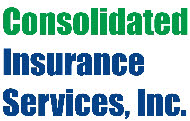Consolidated Insurance Services, Inc. © All rights reserved | Privacy Policy



www.insurance-motorsports.com • www.consolidatedins.com

Q: What kinds of questions should I be expected to answer when I am applying for
an insurance policy? Why do insurers need so much information?
A:
When you apply for an insurance policy, you will be asked a number of questions. For example, the agent might ask you your name, age, gender, address, etc. In addition, you will be asked a number of other questions which will be used to determine how likely you are to make a claim.
When an insurance company is deciding whether or not to offer automobile insurance to a potential customer, it will want to know about the person's previous driving record, whether they have any recent accidents or tickets, and what type of car is to be insured.
Insurance companies have different programs for different customers. Adults with good driving records will generally pay less for auto insurance than will a young driver with traffic tickets. In order to determine which program you qualify for, an insurance company needs basic information about you.
In addition to your age, gender and driving experience, information about the vehicle you drive, and how you drive it, is also needed to determine a fair price. For example, a large luxury car costs more to repair or replace than a sub-compact; and, someone who commutes 30 miles each way is more likely to be in an accident than someone who rides the bus to work and drives only on weekends.
Q: What are the advantages to using an agent to purchase insurance?
A:
By using an agent to purchase insurance, the policyholder receives more personal service. An agent with whom there is direct contact can be vital when purchasing a product and absolutely necessary when filing a claim. A local, independent agent is able to deliver quality insurance with competitive pricing and local personalized service.
Q: How do I report a claim?
A:
Please check our claim form page for a listing of companies and reporting numbers or you can contact us directly at 317-846-5805.
Q: What should I consider when purchasing automobile insurance?
A:
There are a number of factors you should consider when purchasing any product or service, and insurance is no different. Here is a checklist of things you should consider when purchasing automobile insurance.
1. Don't base your decision on price alone. Base your decision on value - what you get for what you pay. Consider the quality of company's claims service and consumer education.
2. Purchase the amount of liability coverage which makes sense for you.
3. You should decide which optional coverage's you want. For example, do you want optional physical damage coverage or is the market value of your car too low to warrant purchasing them.
4. Once you have decided what you want in your automobile insurance policy, you can now decide from whom you would like to purchase the insurance. For example, you may decide you like the idea of purchasing insurance from a mutual company rather than a stock company.
Q: I have an older car whose current market value is very low - do I really need
to purchase automobile insurance?
A:
Most states have enacted compulsory insurance laws that require drivers to have at least some automobile liability insurance. These laws were enacted to ensure that victims of automobile accidents receive compensation when their losses are caused by the actions of another individual who was negligent.
Except for the minimum liability coverage's that you may be required to purchase, many people with older cars decide not to purchase any of the physical damage coverages. It is often the case that the cost of repairing the damages to an older car is greater than its value. In these cases, your insurer will usually just "total" the car and give you a check for the car's market value less the deductible.
Q: Suppose I lend my car to a friend, is he/she covered under my automobile insurance
policy?
A:
Whenever you knowingly loan your car to a friend or an associate, he or she will be covered under your automobile insurance policy. In fact, even if you do not give explicit permission each time a person borrows your car, they are still covered under your automobile insurance policy as long as they had a reasonable belief that you would have given them permission to drive the car.
Q: What is the difference between collision physical damage coverage and comprehensive
physical damage coverage?
A:
Collision is defined as losses you incur when your automobile collides with another car or object. For example, if you hit a car in a parking lot, the damages to your car will be paid under your collision coverage.
Comprehensive provides coverage for most other direct physical damage losses you could incur. For example, damage to your car from a hailstorm will be covered under your comprehensive coverage.
It is important to know the difference between the collision and comprehensive coverage's for a couple of reasons.
1. In order to make an informed purchasing decision about these optional coverages, you need to know the difference between them.
2. The deductibles under the collision and comprehensive coverages are often different in amount.
Q: What is homeowners insurance and who should buy this type of coverage?
A:
Homeowners insurance is one of the most popular forms of personal lines insurance on the market today. The typical homeowners policy has two main sections: Section I covers the property of the insured and Section II provides personal liability coverage to the insured. Almost anyone who owns, rents or leases property has a need for this type of insurance. And many times, homeowners insurance is required by the lender as part of the requirements in obtaining a mortgage.
Q: What factors should I consider when purchasing homeowners insurance?
A:
There are a number of factors you should consider when purchasing any product or service, and insurance is no different.
Here is a checklist of things you should consider when you purchase homeowners insurance.
1. First and foremost, purchase the amount and type of insurance that you need. Remember that if your policy limit is less than 80% of the replacement cost of your home, any loss payment from your insurance company will be subject to a coinsurance penalty. Also, determine the amount of personal property insurance and personal liability coverage that you need.
2. Second, determine which, if any, additional endorsements you want to add to your policy. For example, do you want the personal property replacement cost endorsement or the earthquake endorsement?
3. Finally, once you have decided on the coverage you want in your homeowners insurance policy, you can now decide which insurer you would like to purchase the insurance from.
Q: What are the policy limits (i.e., coverage limits) in the standard homeowners
policy?
A:
[Note: this answer is based on the Insurance Services Office's HO-3 policy.]
Coverages
A and B provide protection to the dwelling and other structures on the premises on
an "all risks" basis up to the policy limits. The policy limit for Coverage A is
set by the policy owner at the time the insurance is purchased. The policy limit
for Coverage B is usually equal to 10% of the policy limit on Coverage A. Coverage
C covers losses to the insured's personal property on a named perils basis. The policy
limit on Coverage C is equal to 50% of the policy limit on Coverage A. Coverage D
covers the additional expenses that the policy owner may incur when the residence
cannot be used because of an insured loss. The policy limit for Coverage D is equal
to 20% of the policy limit on Coverage A. The coverage limit on Cover E - Personal
Liability - is determined by the policy owner at the time the policy is issued. The
coverage limit on Coverage F - Medical Payments to Others - is usually set at $1,000
per injured person.
Q: Do I need Flood Coverage?
A:
That depends on whether your properties lies in a flood plain as determined by US Government Flood Maps. We have these maps available and can provide flood coverage should it be required or desirable. Flood is NOT covered in a homeowners policy.
Q: Why would I want to buy renters insurance?
A:
If you live in an apartment or a rented house, renters insurance provides important coverage for both you and your possessions. A standard renter’s policy protects your personal property in many certain cases of theft or damage and may pay for temporary living expenses if your rental is damaged (including loss of use). It can also shield you from personal liability. Anyone who leases a house or apartment needs to consider this type of coverage.
Q: How does a renter’s policy protect my personal property?
A:
A renter’s policy provides named perils coverage. This means your property is protected from all the perils that are specifically listed on your policy. These usually include:
· Fire or lightning
· Windstorm or hail
· Explosions
· Riots
· Aircraft
· Vehicles
· Smoke
· Vandalism or malicious mischief
· Theft
· Falling objects
· Weight of ice, snow, or sleet
· Accidental discharge or overflow of water or steam
· Sudden and accidental tearing apart, cracking, burning, or bulging
· Freezing
· Sudden and accidental damage from artificially generated electrical current
· Volcanic eruptions (but this doesn't include earthquake or tremors)
Renter’s coverage applies to your personal property no matter where you are in the world. This means you're covered when you are on vacation as well as at home.
Q: What if I share my apartment with a roommate? Do we both need to have renters
insurance?
A:
Standard renter’s policies cover only you and relatives that live with you. If your roommate is not a relative, each of you will need your own renter’s policy to cover your own property and to provide you liability coverage for your own actions.
Q: What is a personal umbrella liability policy?
A:
The personal umbrella liability policy is an insurance contract designed to accomplish two goals.
1. First, it increases the liability protection beyond what the policy owner already has in his or her homeowners and automobile insurance policies.
2. Second, the personal umbrella policy is designed to fill in the gaps in a policy owner's liability coverage since several types of liability exposures exist that are not covered by automobile and homeowners policies.
Together with homeowners and automobile insurance policies, broad personal liability protection is attained through the purchase of a personal umbrella policy.
Q: How do I know if I need a personal umbrella liability policy?
A:
It used to be that the only people who needed personal umbrella liability policies were wealthy individuals who had sizable amounts of personal assets that would be at risk in a lawsuit.
However, in our very litigious society, many people are realizing that they have a need for more liability insurance than what is provided under their homeowners and automobile insurance policies. The personal umbrella policy is ideally suited to provide this protection.
Q: What does 80% co-insurance mean?
A:
Insurance carriers require that an insured party pay 80% of the replacement cost in order to collect a partial loss in full. This is the way the insurance company encourages all insured's to adequately insure their property in relation to other insured's.
Q: Can other people drive my business vehicle?
A:
Other people may drive your vehicle with your permission. It is important that they be listed on your policy if they are regular drivers of the vehicle.
Q: How does an audit work?
A:
At the end of the policy term, the insurance company will review the policy and either charge or credit the policyholder based upon an audit of estimated figures. Examples of estimated auditable items include sales and payroll. Audits can be performed onsite by an auditor or via mail or telephone. A premium is charged for audit estimations.
Q: Why do I need certificates of insurance from sub-contractors?
A:
An audit may require you to show proof that sub-contractors had their own insurance coverage. The sub-contractors' certificates of insurance will prevent you from being charged for their exposure.
Q: What is General Liability?
A:
General Liability provides coverage for other individuals who are on your property and/or exposed to your operations.
Q: What does Products/Completed Operations mean?
A:
Products/Completed Operations refers to the liability coverage for damages caused by your operation or products after the point at which you no longer have control of them.
Q: What is Business Interruption/Extra Expense coverage?
A:
Business Interruption/Extra Expense coverage provides coverage for income loss and the expense of establishing a temporary site during repairs due to damages related to a fire or compensable loss.
Q: How do I request a Certificate of Insurance?
A:
You can either fill out the Request for Certificate of Insurance form here on our website or you can contact us directly at 317-846-5805.
Business Property Insurance FAQ's
Q: What is Business Income Coverage (Time Element)?
A:
Business Income Coverage provides coverage for loss of earnings and ongoing expenses when operations are curtailed or suspended due to property damage resulting from a covered cause of loss.
Q: Should I purchase special coverage for my computer equipment?
A:
Electronic Data Processing (EDP) equipment can be covered as unscheduled business personal property in "commercial property" forms such as the building and personal property coverage. An EDP equipment floater can provide added benefits. Many EDP floaters cover special perils such as mechanical or electrical breakdown and typically cover property in transit.
Q: What is co-insurance?
A:
In property insurance, co-insurance is a clause under which the insured shares in losses to the extent that the/she is underinsured at the time of a loss. You may have heard of co-insurance relative to health insurance; this is a provision in which the insured and the insurance company will share covered losses in an agreed proportion.
Business General Liability FAQ's
Q: Will my liability insurance cover me if I am sued in another country?
A:
Most liability policies provide coverage for lawsuits only if they are brought in the United States, its territories and Canada.
Q: What is the difference between Employee Benefits Liability Coverage and a Fiduciary
Bond?
A:
The Employee Benefits Liability policy was designed primarily for a variety of benefit plans to provide coverage for administrative errors and omissions. The Fiduciary Bond policy was designed to cover a fiduciary's ERISA (Employee Retirement Income Security Act) exposures that are caused by a "wrongful act." Fiduciary coverage responds to claims for damages arising out of improper investments as well as plan and employee advice.
Q: What is an Umbrella Policy?
A:
An umbrella policy provides additional limits of insurance over and above underlying coverage's found on a General Liability, Automobile or Workers' Compensation policy. If there is a claim, the underlying policy will pay its limits of liability and the umbrella policy coverage would then be activated.
Q: When do I need to purchase Workers' Compensation Insurance?
A:
Most states require an employer to purchase workers' compensation insurance as soon as they have employees. These states also consider a corporate entity to have employees from the moment the corporation is formed.
Workers' compensation insurance will provide medical expense and disability income for injured employees as required by the laws of each state. In addition, the insurer will defend any claim proceeding or suit against the insured for benefits payable under the policy.
Premium shall be computed on the basis of the total remuneration (payroll) paid or payable by the insured for services covered by the policy.
Q: What should be included in the remuneration?
A:
In addition to ordinary wages or salaries, remuneration includes several other types of compensation. These include:
· Bonuses
· Extra pay for overtime work except as provided in Rule V-E
· Pay for holidays, vacations or periods of sickness
· Payment by an employer of amounts otherwise required by law to be paid by employees to statutory insurance or pension plans
· Payment to employees on any basis other than time worked, such as piece work, profit sharing or incentive plans
· Payment or allowance for hand tools or power tools used by hand and provided by employees and used in their work operations for the insured
· The rental value of an apartment or house provided for an employee based on comparable accommodations
· The value of lodging received by employees as part of their pay
· The value of meals received by employees as part of their pay to the extent shown in the insured's records
· The value of store certificates, merchandise, credits or any other substitute for money received by employees as part of their pay
Items not included are:
· Times and other gratuities received by employees
· Payments by an employer to group insurance or group pension plans for employees other than payment covered by Rule V-B.2e
· The value of special rewards for individual invention or discovery
· Dismissal or severance payments except for the time worked or accrued vacations.
Please also feel free to call us at (317) 846-5805 on any question or email us at Consolidated Insurance for any question you may have.